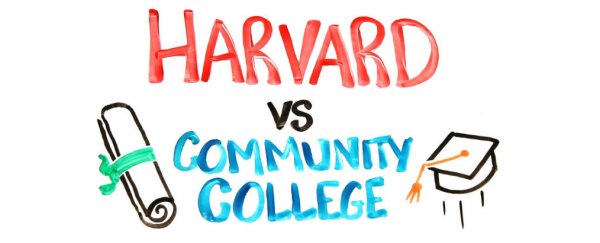
A favourite motivator among parents and teachers dealing with teenagers who DNGAF is: "If you don't work hard and get good grades, you won't get into a good college or university, which means you won't be successful and your life will pretty much be over." But is there any truth to this? The latest episode of AsapSCIENCE hits us with some sweet, sweet statistics that will make you think differently about Harvard versus Greendale (okay, okay, bad example).
First up, if you take a look at the SAT scores of students at your average college or university, those who had the highest scores ended up representing over 50 percent of the people who get degrees at these schools, whereas the students with the lowest SAT scores represented 18 percent of the people who graduated. And that makes sense.
But when you look at the same stats for a top-tier school like Harvard, the students with the lowest SAT scores are 'smarter' than the best students at the average school, but their rate of graduation is strangely similar to those with the lowest SAT scores in an average school. So students who would be absolutely killing it at the average school are actually failing at the best schools money could buy. What's going on here?
The phenomenon is known as the Big Fish - Little Pond Effect. As the video explains, as humans, we tend to compare ourselves not globally, but locally - to our immediate peers. Which means if you're smart enough to get into Harvard, you're less likely to compare yourself to the people who got into an average school, and more likely to compare yourself to your brilliant peers. And if you're in the bottom half of your class… hello, shame spiral of inadequacy and self-doubt.
And this phenomenon isn't just reserved for schools - as the guys at AsapSCIENCE explain, the suicide rates for people in countries that tout themselves as "happy" are significanty higher than in countries that describe themselves as "sad". Because being sad in a sea of people you assume to be happy is so much worse than being sad with sad people.
Want more stats? Watch the video above to see how deep this phenomenon actually goes, and find out what the formula - according to science - is for success.
